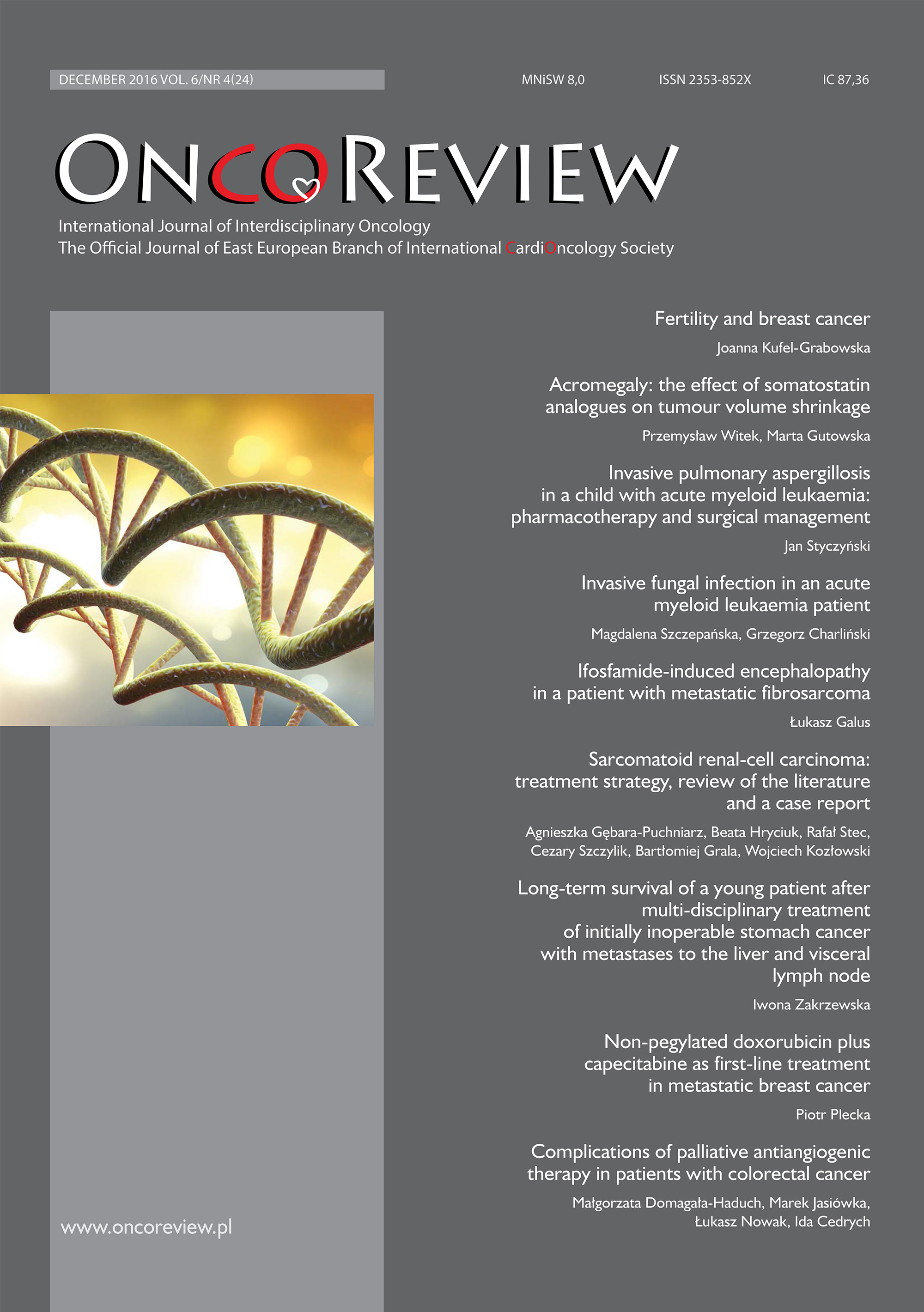Zastosowanie niepegylowanej doksorubicyny z kapecytabiną w pierwszym rzucie leczenia rozsianego raka piersi Original article
##plugins.themes.bootstrap3.article.main##
Abstrakt
Cel: Określenie profilu toksyczności i skuteczności podawania łącznie niepegylowanej doksorubicyny i kapecytabiny w schemacie LipAX.
Materiały i metody: Analizie poddano 5 pacjentek leczonych w I rzucie rozsianego raka piersi. Otrzymywały one dożylne wlewy niepegylowanej doksorubicyny i doustnie kapecytabinę w dawkach typowych dla monoterapii do czasu progresji lub wystąpienia nieakceptowalnej toksyczności.
Wyniki: Badane otrzymały łącznie 26 pełnych kursów w schemacie LipAX. Podczas leczenia wystąpiło 15 powikłań, w tym 7 ciężkich, w III stopniu natężenia. Doszło jedynie do 2 powikłań hematologicznych, pozostałych 13 miało charakter niehematologiczny. Działania niepożądane nie wystąpiły u jednej chorej. Oprócz leczenia objawowego z ich powodu 2 razy zmniejszano dawkę kapecytabiny i raz – niepegylowanej doksorubicyny. Korzyść kliniczną odniosły 4 chore, a u jednej wystąpiła progresja w trakcie leczenia. Średni czas do progresji wyniósł 10,4 miesiąca, a średni czas przeżycia – 34,2 miesiąca. W okresie obserwacji trwającej 54 miesiące doszło do 4 zgonów, a 1 badana żyje nadal i jest leczona.
Wnioski: Schemat LipAX był dość dobrze tolerowany, ale ze względu na to, że większość pacjentek zakończyła leczenie z powodu działań niepożądanych, a nie progresji, należy rozważyć odpowiednią redukcję dawek cytostatyków. Schemat LipAX pozwala uzyskać u niektórych chorych długotrwałe remisje, co zachęca do dalszych badań nad tą formą.
Pobrania
##plugins.generic.paperbuzz.metrics##
##plugins.themes.bootstrap3.article.details##

Utwór dostępny jest na licencji Creative Commons Uznanie autorstwa – Użycie niekomercyjne 4.0 Międzynarodowe.
Copyright: © Medical Education sp. z o.o. This is an Open Access article distributed under the terms of the Attribution-NonCommercial 4.0 International (CC BY-NC 4.0). License (https://creativecommons.org/licenses/by-nc/4.0/), allowing third parties to copy and redistribute the material in any medium or format and to remix, transform, and build upon the material, provided the original work is properly cited and states its license.
Address reprint requests to: Medical Education, Marcin Kuźma (marcin.kuzma@mededu.pl)
Bibliografia
2. Stavridi F, Palmieri C. Efficacy and toxicity of nonpegylated liposomal doxorubicin in breast cancer. Expert Rev. Anticancer Ther 2008; 8(12): 1859-1869.
3. Harris L, Batist G, Belt R et al. Liposome-Encapsulated Doxorubicin Compared with Conventional Doxorubicin in a Randomized Multicenter Trial as First Line Therapy of Metastatic Breast Carcinoma. Cancer 2002; 94(1): 25-36.
4. Bajetta E, Procopio G, Celio L et al. Safety and efficacy of two different doses of capecitabine in the treatment of advanced breast cancer in older women. J Clin Oncol 2005; 23: 2155-2161.
5. Valero V, Buzdar AU, Theriault RL et al. Phase II trial of liposome-encapsulated doxorubicin, cyclophosphamide and fluorouracil as first-line therapy in patients with metastatic breast cancer. J Clin Oncol 1999; 17: 1425-1434.
6. Chan S, Davidson N, Juozaityte E et al. Phase III trial of liposomal doxorubicin and cyclophosphamide compared with epirubicin and cyclophosphamide as first-line therapy for metastatic breast cancer. Ann Oncol 2004; 15: 1524-1534.
7. Colomer R, Tusquerts I, Calvo L et al. Liposomal doxorubicin (M) plus gemcitabine (G) as first line treatment in metastatic breast cancer: a phase I-II study. J Clin Oncol 2006; 24(suppl 18): 10651.
8. Sparano JA, Vrdoljak E, Rixe O et al. Randomized Phase III Trial of Ixabepilone Plus Capecitabine Versus Capecitabine in Patients With Metastatic Breast Cancer Previously Treated With an Anthracycline and a Taxane. J Clin Oncol 2010; 28(20): 3256-3263.
9. Robert NJ, Dieras V, Glaspy J et al. Ribbon-1: Randomized, Double-Blind, Placebo-Controled, Phase III Trial of Chemotherapy With or Without Bavacizimab for First-Line Treatment of Human Epidermal Growth Factor Receptor 2-Negarive, Locally Recurrent or Metastatic Breast Cancer. J Clin Ocol 2011; 29(10): 1252-1261.
10. Hennessy BT, Gauthier AM, Michaud LB et al. Lower dose capecitabine has a more favorable therapeutic index in metastatic breast cancer: retrospective analysis of patients treated at M.D. Anderson Cancer Center and a review of capecitabine toxicity in the literature. Ann Oncol 2005; 16: 1286-1296.
11. Batist G, Ramakrishnan G, Rao CS et al. Reduced cardiotoxicity and preserved antitumor efficacy of liposome encapsulated doxorubicin and cyclophosphamide compared with conventional doxorubicin and cyclophosphamide in a randomized multicenter trial of metastatic breast cancer. J Clin Oncol 2001; 19: 1444-1454.

